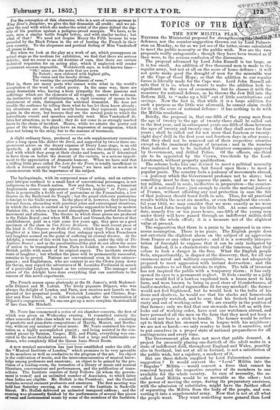The harlequinade, with its compound mass of action, and an
extrava- gant intrigue confined to a small knot of conventional personages, is not indigenous to the French nation. Now and then, to be sure, a transient Anglomania causes an appearance of "Clown Anglais " at Paris; and there is perpetually a feeble sort of pantomime at the Funambules, a low theatre on the Boulevard du Temple ; but the grand elaborate pantomime is foreign to the Gallic nature. In the place of it, however, they have long five-act farces, abounding with practical jokes and extravagant situations, in which the action is carried on by persons supposed to belong to modern Parisian life, to whom a lax moral atmosphere allows perfect freedom of movement and allusion. The theatre in which these pieces are produced is the Palais Royal ; and when MM. Ravel and Grassot, the heroes of that establishment, paid us a visit some few years ago, they gave us a good specimen of the class in tine Fiivre Bredante. The most recent piece of the kind is Un Chapeau de Pale d'Italie, which kept Paris in a roar of laughter at a time just preceding that unhappy epoch when Frenchmen and laughter seemed on the point of suffering an eternal divorce. At the Adelphi, a version of this work has been produced, under the title of The Leghorn Bonnet ; and as the peculiarities of the plot do not allow the scene of action to be transplanted from Paris to London it comes before the British public with much of its original aspect. The incidents awaken roars of laughter ; but whether the piece will be permanently successful, remains to be proved. Nations are conventional even in their extrava- gances ; and Englishmen, who are content to see the Clown jump down his throat, may regard the adventures of M. Leonidas Ferdinand in search of a particular Leghorn bonnet as too extravagant. The manager and actors of the Adelphi have done everything that can contribute to the success of this novel experiment.


























 Previous page
Previous page